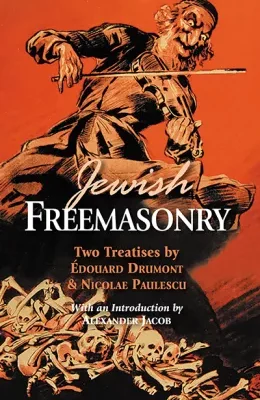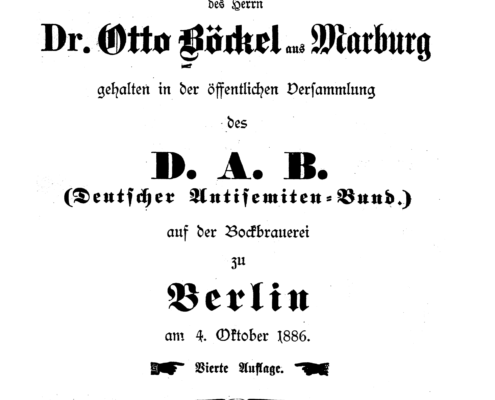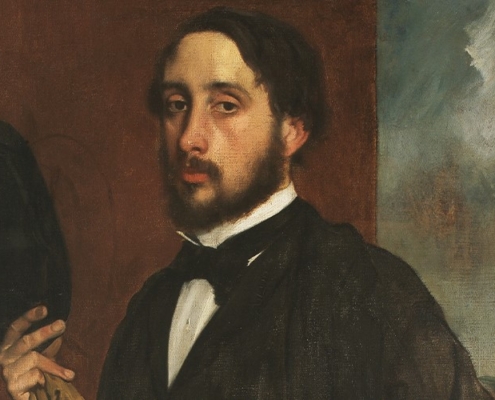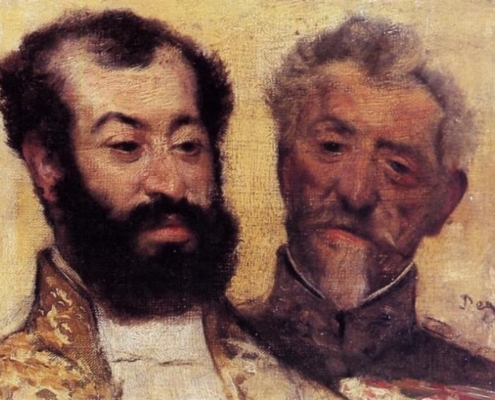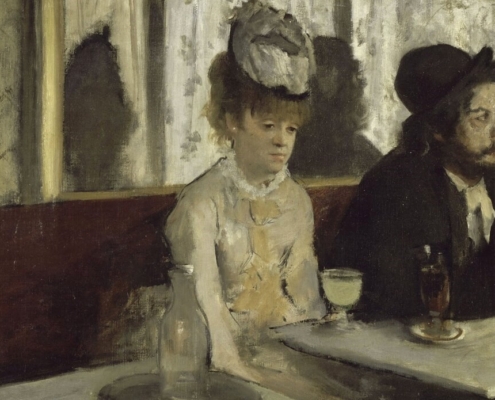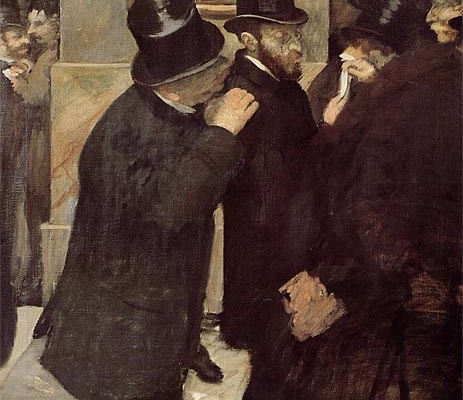Paul Lagarde on Jews and Indo-Europeans, Part 3: Jews and Politics
There remains one point to be discussed: the participation of the Jews in politics. From the start one should suppose that the members of a nation that lives in the midst of enthusiastic followers of the nationalist principle would have enough sense of honor to raise demands, even for their nationality itself, that Jewry will work for the founding of a state located in Palestine. However, from an ethical point of view, the Jew thinks as little as the parasite that battens on a foreign body ubi bene, ibi patria.[1] One should further think that a nation foregoing a political life for almost two thousand years would decide to remain far from politics that is unaccustomed to them; a Jew who politicizes today, however, offers the spectacle of an eighty-year-old man who, because he once as a boy—and no longer—rode with a sword and went skating, embarks on a sabre duel, romps on a stallion before his beloved, and does a big act on hoar frost. One should, thirdly, suppose that all nations that have behind them an uninterrupted political work of centuries, even if often not enjoyable, would find it especially stupid to allow themselves to be advised on the political work now at hand by those who cannot have, and do not have, insight into politics, who, faced with the tasks of German political life, stand with the ingenuousness of a jackdaw that flies away from a copy of Iphigenia or Antigone lying tattered in a garden or over a score of Grell’s[2] Mass for sixteen voices. But matters have developed differently than they should have according to propriety and reasonableness. The long-dammed stream of Jewish skill pours out like the well-known Wilhelmshöher waterfall; after a long pause, Israel gives birth to politicians, people like Johann Jacoby,[3] Lasker, Ludwig Loewe,[4] Singer, Sabor. “Small Germany” is the battle-cry; they thus appear on the scene with the betrayal of Greater Germany. The Jews of Austria must indeed first be able to eat up Austria in peace before they go on to the harder task of digesting the “new Reich.” Almost all of them appear with [promises of] utopias, the loudest of them with principles which, when one has tried to implement, must give up after a short time, and the most Jewish of them with “No, No, No” against everything that is, even if not the best, still necessary at the moment. And since a Jew “will not prostitute himself before potentates,” Iohann Jacobi says to the King of Prussia who finally plucks up courage against the dirt of the revolution acted out by the Jews, in his house, the great words: “that is the misfortune of kings, that they do not wish to hear the truth,” and Mr. Singer remains seated when the German Reichstag rises in honour of Field Marshal Moltke.[5] If a Pincus Hersch, convicted on account of a serious procuration, should at one time direct an appeal for clemency to the German Kaiser, he will sign “with friendly greetings, Pincus Hersch,” for “wagging his tail” is not his style and he—who is a Republican—tolerates the Kaiser of Germany only according to I Samuel 8.[6]
Why does the German Philistine let himself be led by the Jews by the nose? Because he is a Philistine.
Jacob Grimm once wrote to his brother Wilhelm that, after his brother, nobody stood closer to his heart than Savigny[7] and Clemens Brentano.[8] This Clemens Brentano is too good to be reproached for the ale-bench; I must nevertheless cite an essay of Brentano’s against the danger of seeing him too drawn into the mire. In the fifth volume of his collected works is printed Brentano’s “jocular essay on the Philistines in and according to history,” which once appeared in Berlin by itself, but became known to me only very recently, even though I have always loved Clemens. Brentano recognises the Jews and the Philistines as the two heads of the old serpent set one against the other; he would agree with me if I said briefly that the Jews and the Philistines (which latter are now called Liberals) have in common that they deny history, that they think that something can be good and lasting that does not appear as the continuation of an already existent good or as the combating of a bad that has already been combated. The strife of the world does not start from today, because God is eternal and his enemy, the Devil, is older than the world of humans.
Moritz Lazarus and Levin Goldschmidt[9] had a sense of the situation when they warned the Jews before the last Reichstag elections to leave the progressive party if they wished to be tolerated in Germany. They acted as Jews when they presented to the Reich Chancellor, no matter in what way, the prospect of the votes of Jewry if he would forbid anti-Semitism: something would be gained thereby. They did not perceive that the Jews would have to stop being Jews if they—who, in Brentano’s words (1887), wish to make a business of the manna fallen to them from heaven three thousand years ago—wished to recognise for once that one can appease the hunger of 1887 only with the corn grown shortly before 1887. They did not perceive that, in England and Germany, a considerable number of commoners were accepted into the aristocracy but that this aristocracy of recent date could stop being parvenus only because they found an old aristocracy of ancient custom and emulated them, and that, analogously, every member of a foreign nation can become a German but on condition that he acknowledge Germany and indeed acknowledge it as something much higher than one’s own nationality that has to be given up, but that he cannot, and will not, become a German if he prides himself on the uniqueness of his own nationality, if he wishes to become or be a German and, as an entrance courtesy, he undertakes to make the Germans like himself and to master them.[10] Those two have not perceived that every government of Europe that is not anti-Semitic—in my sense—conducts a betrayal of the people whom they serve. They are as little aware that they imagine that there are among us respectable men who are not anti-Semites—in the good sense; I know born Jews who suffer badly under the anti-Semitism of the masses and themselves practise my anti-Semitism as necessary.
And as proof that Jews as Jews never have an understanding of real life when it is not represented through exchange, interest coupons and Deutschmarks, Lazarus and Goldschmidt are ostracized by Jewry. “May he not be remembered any more”[11]—that is how it goes in the old excommunication formula of the synagogue against Lazarus. Lazarus was one of the idols of his people, though an idol the reverence for whom I never understood; now he has fallen and his place is vacant. Perhaps Mr. Abraham Berliner[12] notes (14,15) now that I was not so far removed from the right path when I considered a refutation of Mr. Graetz signed “M.L.” as being written by Moritz Lazarus; I knew the man well enough to know that the essay “To the German Jews”[13] bothered him a long time.
I have for years been convinced that Jewry nested in the Christian-Germanic-Roman cultural world is, as a result of the above-mentioned characteristics, the cancer of our entire life. Our economy cannot thrive on account of them, our nationality withers, the truth is withheld from us by them, the Church is hostile to them and makes them contemptible instead of helping them to a new life.
Friendship is possible with every individual Jew, but only on condition that he cease to be a Jew. Jewry as such must disappear. And the individual Jews will be glad to experience by themselves what Ludwig Steub,[14] certainly a man of insight and intelligence, wrote to Mr. Isidore Singer in Vienna, thus to a Jew:
There are no more persecutions as soon as there are no more Jews. That is why I greet with joy all measures that can make them disappear, as for example the freedom to marry. I do not believe that tasks are still placed for the Jews that cannot also be solved by Christians and to that extent I see no great loss if they disappear from the screen. They will obtain peace only when they are no longer there.
I have often enough acknowledged that we Europeans, Christians are not what we should be when there are still Jews among us; I have therefore thrown a good part of the blame for the deep decadence of our life on our shoulders. But where there is heaped up such a mass of putrefaction as in the Israel of Europe one achieves one’s goal only through an inner physic after one has removed the collected pus through a surgical procedure. I have therefore taken from the Jews that for whose sake they are Jews and through which they rule, money, thrown out the financial monopoly, and explained it in my Deutsche Schriften 496–498. That I am thereby in the right is shown to me by the rage of Mr. Abraham Berliner (26):
The speech about the methods of taking away wealth and income from the Jews truly deserved to be rewarded with the diploma of a gang of burglars from the remotest recess of Corsica.
Here Mr. Abraham Berliner is apparently not anxious in the choice of his expressions. He clearly does not fear “crossing the boundaries of the penal code” in this sentence. Perhaps he was interested to find out from the front page of the Vossische Zeitung of 25 February 1887 that in the Kreuzzeitung, in the “national” programme of the Conservative Party a high stock-exchange turnover tax, or a “nationalization of the Reich bank” appears. We do not fly, we go step by step.
Europe suffers under a debt burden of 96,000 million Deutschmarks;[15] those men who stand at the top of European affairs do not have enough insight and will to understand that the shedding of these 96 billion is the very first condition for the prosperity of Europe. Much less do these men understand that through these debts of ours the Jews become important.[16] Roughly calculated, through the manipulations made with these debt securities, every year 960 million marks go into the pockets of the Jewry working in financial trade. So that the ten percent—not paid in Germany, far exceeding that in most other countries of Europe—may not be lacking, I do not calculate the debts of the municipalities, from which Israel likewise has its profits, but remark that the supplies for the army in many states lie regularly in the hands of the Semites and I let you consider what is earned from these supplies.
I present here the last statistical notice known to me on the number of Jews. Of the six million, three hundred thousand Jews that there are overall, there live
| In Europe | 5,400,000 |
| In Asia | 300,000 |
| In Africa | 350,000 |
| In America | 250,000 |
| In Russia | 2,552,000 |
| In Poland | 768,000 |
| In Austria-Hungary | 1,644,000 |
| In Galicia | 688,000 |
| In Germany | 562,000 |
| In Romania | 263,000 |
| In Turkey | 105,000 |
| In the Netherlands | 82,000 |
| In France | 63,000 |
| In Italy | 40,000 |
Whereby one may note that the homeland of the people, Palestine, hosts 25,000 Jews, Prussia has 366,543 of them, and especially Berlin 64,355.
When one divides the number of inhabitants of Europe by five and a half million—the number of Jews of Europe—one will discover what percentage of the population of Europe the Jews constitute. When one then considers that 960 million in expenses that the Jewry of Europe draw from us, one will understand why in 1881 I wrote the sentence:
The Jews remain Jews not only because of our fault but also because of our debts.
It is extremely advantageous to be a Jew. Many Liberals who, in the interest of humanity and justice, speak on behalf of the Jews, and now we, know that the Jews are not sparing with tips—the form of the tip is of no importance—they have funds for this and what they invest in such tips—recommendations, testimonials, contributions, positions on the boards of directors—is advertising capital. But what sort of statesmen, what sort of princes are they who do not put an end to this corruption! Are they really not aware of it?
And the Jews will finally thank us themselves. We shall take from them that which maintains them as Jews: as they will no longer possess money, they will become free of the Old Adam and be forced to become what we are already, Germans.
And now, in conclusion, another observation.
I have for many years been the proponent of the view that the present German Reich and Austria-Hungary should be joined in an indissoluble manner. I have always thought of Central Europe as divided into two but united; numerous students and friends know that I became reserved about a public confession of this view only after the inordinate incapacity of the Austrian statesmen was exposed fully at the Frankfurt Diet of Princes[17] and did not obtain a correction from the Habsburg-Lothringen dynasty.
That the German Reich is not viable is now clear to all: it collapses on account of its position between enemies and unreliable friends, on account of the necessity conditioned by this position of being constantly armed to the teeth, and on account of the financial distress forced by this necessity to live in an armed peace.
That Austria is not viable the representative Knotz said in the Austrian House of Representatives on 5 May 1887. As far as I know regarding the mood of the German Austrians, they all think like Knotz. The Irishman Tahaffey=Taafe[18] has lost all ground among his people: the civil war in Austria—my discussion published almost twelve years ago, in September 1875, can be read in the Complete Edition of my Deutsche Schriften, 134, 135—the civil war stands so clearly recognisable before the gates that indeed the newspaper apparently supported by Count Taafe’s government in which Mr. Güdemann,[19] non sine diis animosus,[20] was able to write the essay printed above on pages 264–268[21]; he had to call his burlesque remarks on Knotz “little dignified,” but the other newspapers (one may read the evening Vossische Zeitung of 7 May 1887) recognised the remarks of the representative for Teschen as essentially justified. The Germans of Austria are the cultural fertilizer—this expression was introduced into the world by me around thirty years ago—with which Czechs, Magyars and other ethnic communities are rendered receptive to the rule of Jewry; our brothers in Austria do not have a right to be Germans any longer, in spite of the declarations made by Kaiser Franz Josef at the Frankfurt Diet of Princes.[22] And Austria is bankrupt.
Everywhere where there is financial distress, especially where there is financial distress as a result of disorganized political conditions, the Jew flourishes on the ruins of nations. For, one may lie about peace or about war, the Jew profits; if Pinkus operates when conditions are bad, Pinkus’s brother Schmul operates when they are good; when there is war, Pinkus and Schmul together undertake the supplies; when thereafter there is peace, they undertake the financing of the necessary loans; the family wins in all cases. Only those served by the family lose.
Financial distress prevails in Germany as in Austria, and indeed as a result of the separation of these two Reichs. From this it follows that the Jews wish to maintain the division of these two Reichs. From this it follows that every patriot of Germany and Austria must wish to remove the division of the Reichs and, for the sake of the unification of the Reichs, the Jews—about individual Jews we can speak.
But the Jews know about more than the financial side of the matter; they know also that every German is not an enemy of individual Jews but an enemy of Israel as Israel. The stronger German life becomes the more certainly Israel will disappear. That is why Israel prevents the rise of a Central European Union. For, in this union there would be no masters but the owners of the land, the Germans. Let Israel exist as an independent nation and establish an independent state; Germany and Austria will live with this nation and state in peaceful concord, and members of this Israelite state will be treated by us as benevolently and politely as the members of any other state will be—as foreigners. That Israel wishes to rule among us, that it allows itself to be praised by Geiger, and Graetz and comrades as the bearers of a cultural mission, since it, in truth, does nothing but exploit Europe financially and praises the grinning grimace of our culture as an ancient family possession of Israel—that we Germans precisely refuse before the other nations because we are younger and more unprotected than the other nations and therefore more sensitive to attacks and diseases.
[1] “The fatherland is where life is good”—a saying that may date back to Marcus Pacuvius, a second-century B.C. Roman poet quoted by Cicero.
[2] Eduard Grell (1800–1886) was a German composer noted for his sacred choral compositions.
[3] Johann Jacoby (1805–1877) was a German Jewish doctor who became a Liberal politician who fought for the emancipation of the Jews.
[4] Ludwig Loewe (1837–1886) was a German Jewish industrialist and member of the Reichstag whose socialist friends included Ferdinand Lassalle and Walther Rathenau.
[5] Helmut von Moltke (1800–1891) was a Prussian Field Marshal who commanded Prussian troops during the Austro-Prussian War and the Franco-Prussian War and was famed for his skills in military organization and strategy.
[6] This refers to section of the first book of Samuel that begins the account of Samuel’s establishment of a monarchy among the Israelites through his appointment of Saul as king.
[7] Friedrich Carl von Savigny (1779–1961) was a famous German jurist.
[8] Clemens Brentano (1778–1842) was a German Romantic poet and Catholic who wrote several essays on Christian subjects.
[9] Levin Goldschmidt (1829–1897) was a German Jewish jurist, academic and member of the Reichstag.
[10] Lagarde: Cf. something on Heinrich Heine, one of the most repulsive subjects that have ever been printed on earth—H. Hüffer in J. Rodenberg’s Deutsche Rundschau, 1878—and something which G. V. Albert has discussed in 1886 in the—at the moment, to me, substandard—Revue des deux mondes and which Mr. Graetz has acknowledged as correct—and in a commendatory way—in his monthly journal of 1886, 188, 189.
[11] This is also the opening line of a poem by Heine, “Nicht gedacht soll seiner werden”
[12] Abraham Berliner (1833–1915) was a German Jewish theologian and historian. He also published a pamphlet against Paul de Lagarde, Paul de Lagarde, nach seiner Natur gezeichnet (1887).
[13] Moritz Lazarus, An die deutschen Juden, 1887.
[14] Ludwig Steub (1812–1888) was a German jurist and writer.
[15] Vossische Zeitung (10 March, 1887).
[16] Paul de Lagarde, Deutsche Schriften, Complete Edition, 413.
[17] The Frankfurt Diet of Princes took place in August 1863 to discuss reforms of the princely Deutscher Bund that lasted from 1815 to 1866. The Deutscher Bund was an association of 39 predominantly German-speaking sovereign states in Central Europe.
[18] Eduard, Graf von Taafe (1833–1895) was an Irish Austrian statesman who served as minister-president of Cisleithania in the Austro-Hungarian Empire.
[19] Moritz (Moshe) Güdemann (1835–1918) was an Austrian Jewish historian and Chief Rabbi of Vienna.
[20] The line from Horace’s ode “Descende caelo” is “non sine diis animosus infans” (“a spirited child not without the help of the gods”).
[21] The pages referred to in Mittheilungen, II, reproduce an article entitled “Der ‘deutsche Nationalheilige’ Paul de Lagarde” by Güdemann published in the Viennese Freie Presse, 42 (February 12, 1887).
[22] de Lagarde, Deutsche Schriften, 507.

